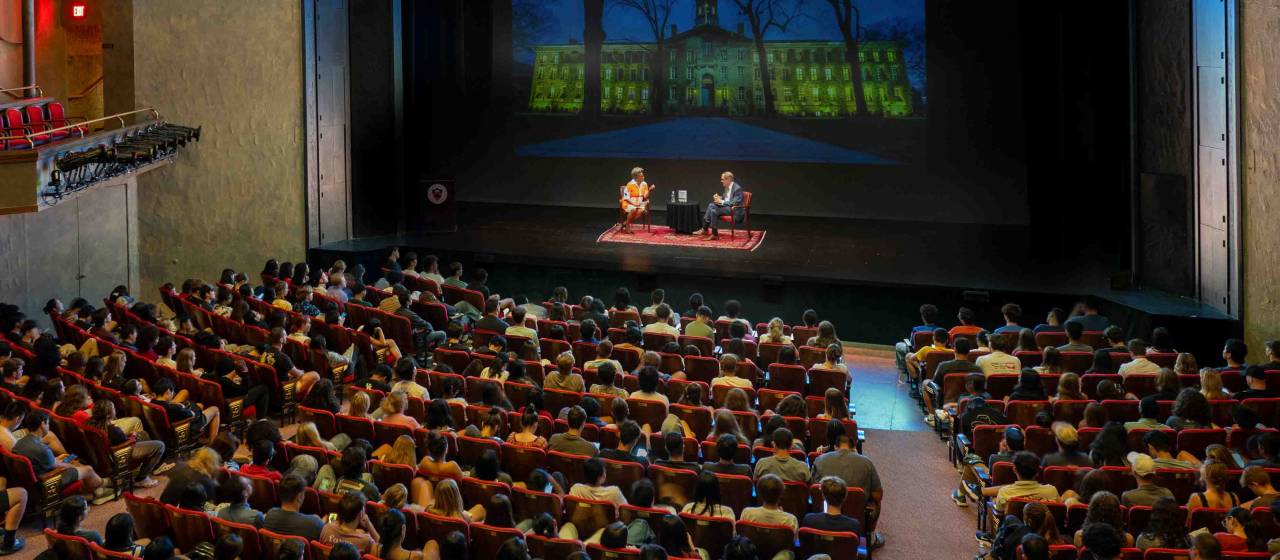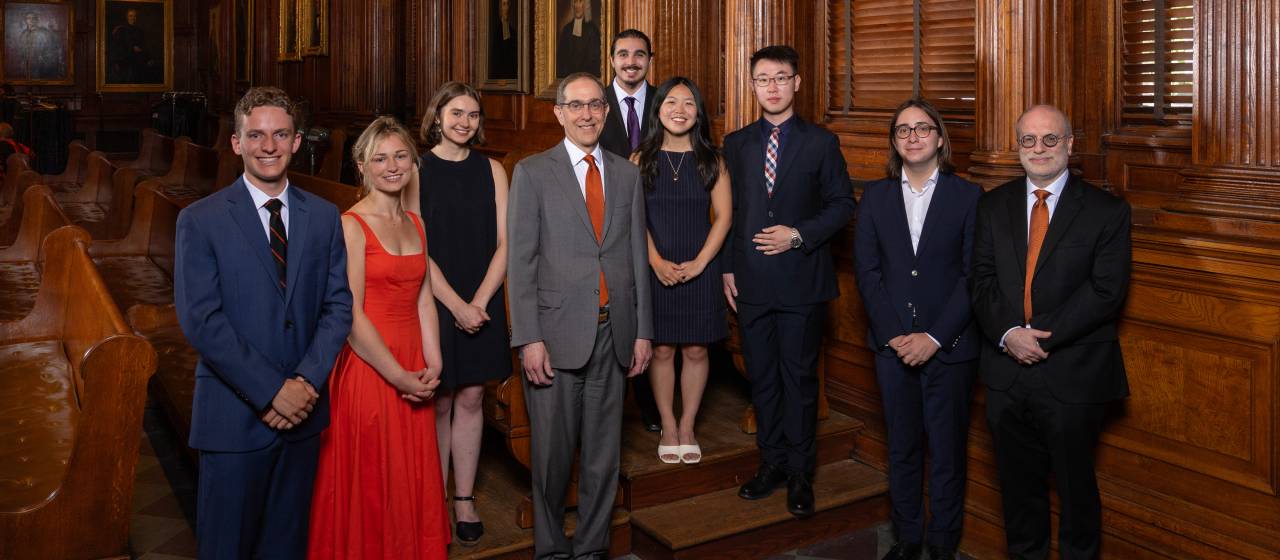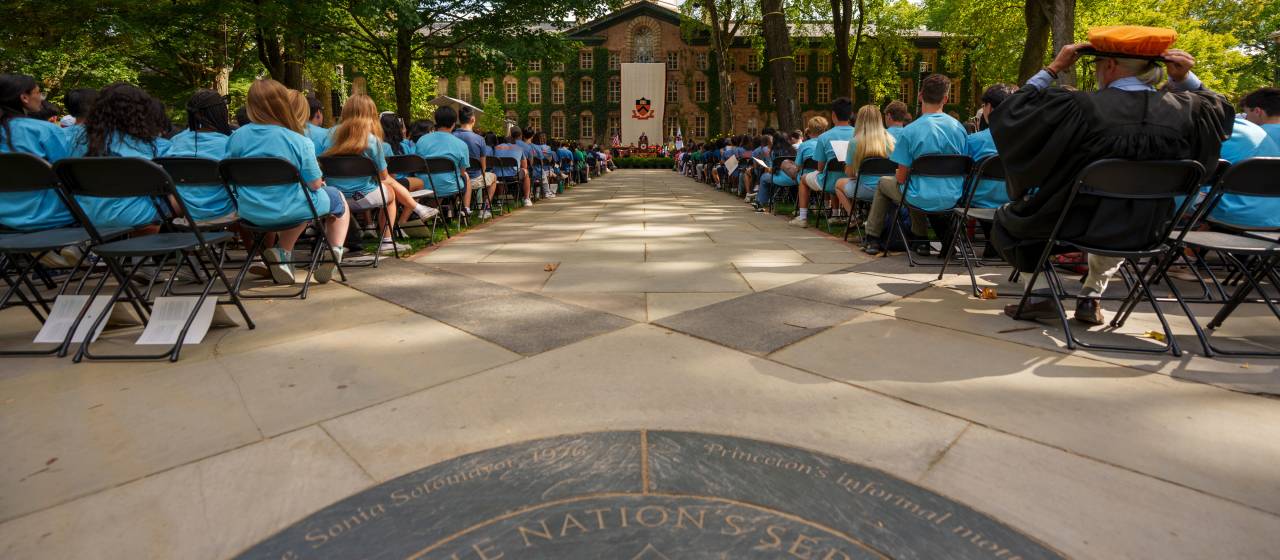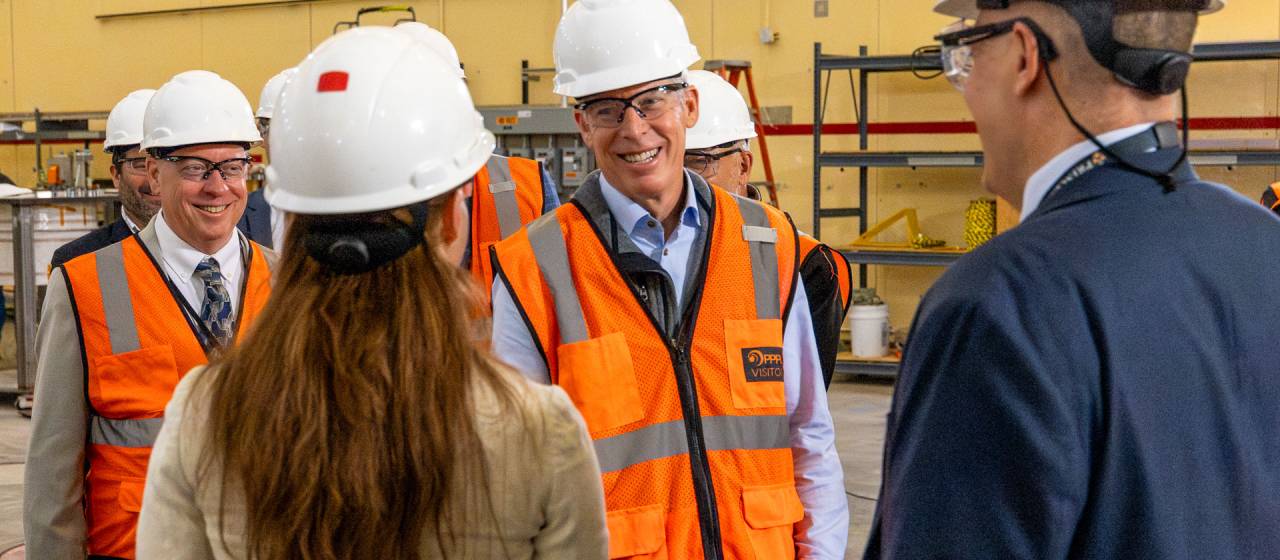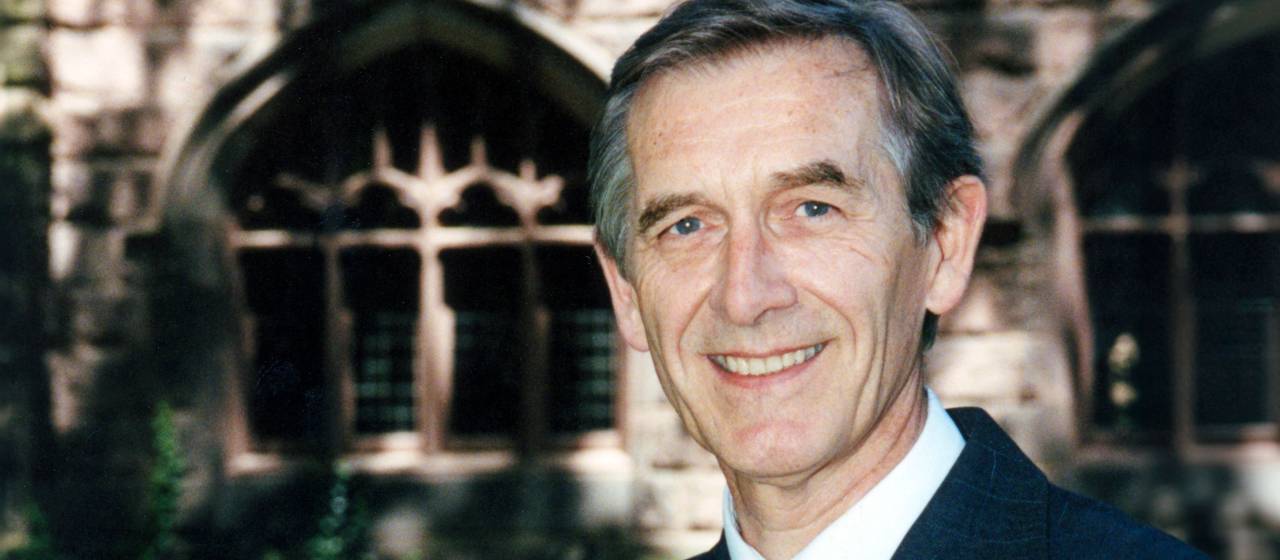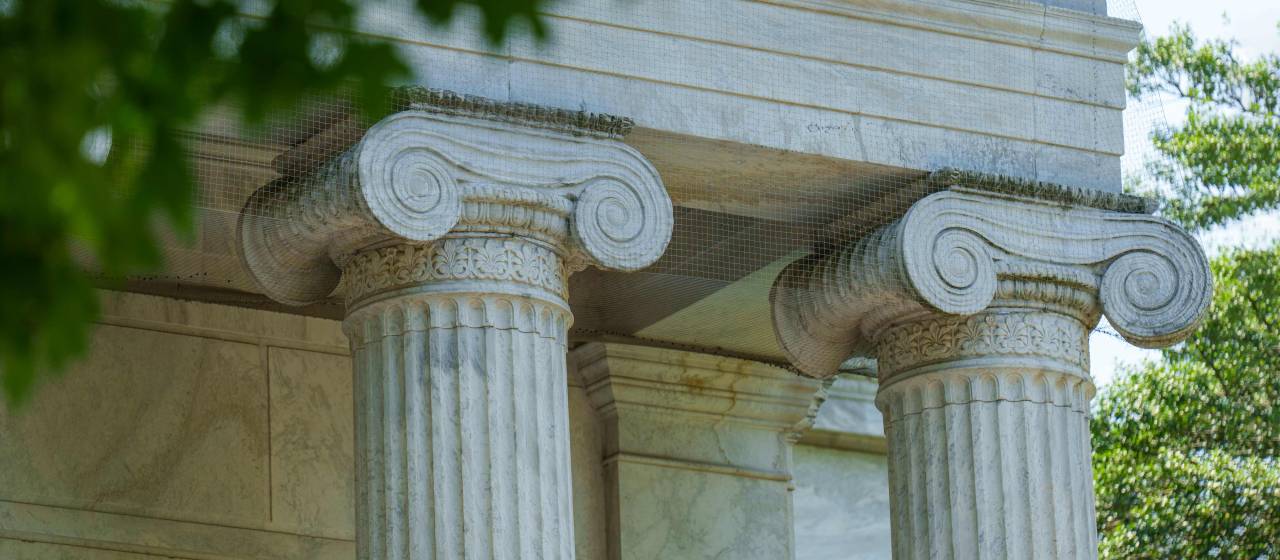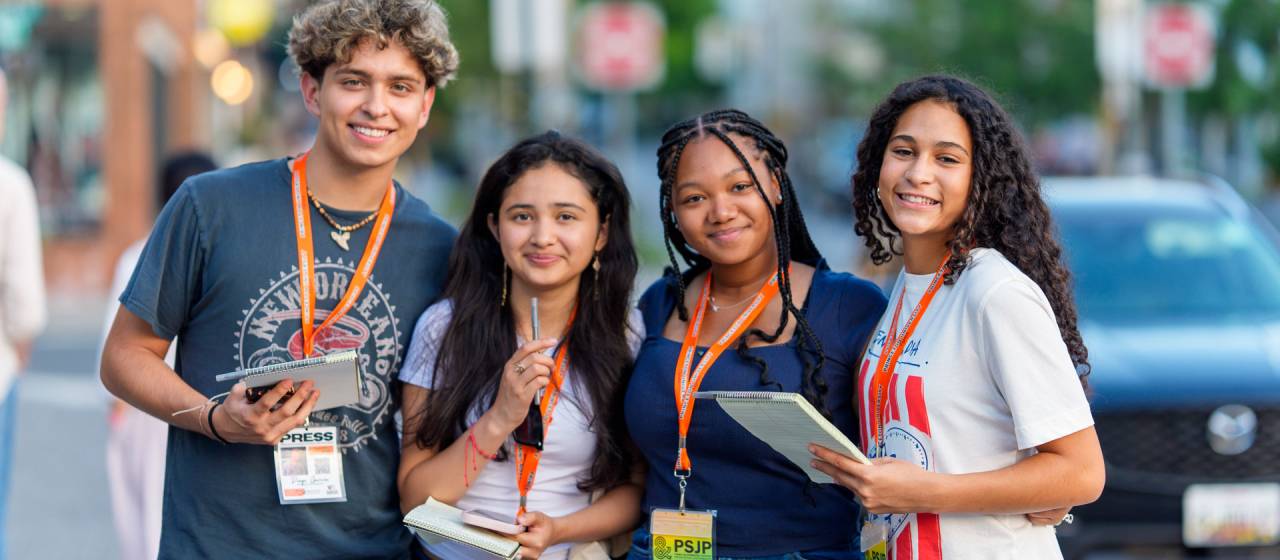Eisgruber addresses incoming students on free expression, civil discourse and ‘conversations that matter’
President Christopher L. Eisgruber welcomed transfer and first-year students to Princeton on Tuesday as new members of a scholarly community where people of every background should feel welcome to engage in vigorous discussion and debate, grounded in the University’s “bold and powerful” free speech protections.
“Research and education require not only that we speak, but that we listen to and learn from one another,” he told the new students at his annual Orientation session on academic freedom and free expression, where he was joined onstage at the McCarter Theatre Center by Vice President for Campus Life W. Rochelle Calhoun. “They require that we respect and benefit from the wide variety of experiences and viewpoints represented on this campus.”
Eisgruber encouraged incoming students to engage across differences of opinion, even when it makes them uncomfortable, noting that “discomfort can sometimes generate understanding and insight.”
“We've all got to work here at Princeton to create the conditions where whatever disagreements we have, we can have conversations that matter,” he said.
The discussion highlighted topics and arguments Eisgruber explores at greater depth in his forthcoming book, “Terms of Respect: How Colleges Get Free Speech Right.” Students will have the opportunity to join Eisgruber for small group discussions about free expression on campus and the other themes of “Terms of Respect” throughout the fall, in events held in Princeton’s residential colleges.
Free speech at Princeton
Princeton promotes a culture of free speech and inclusivity, and collects and reports data to hold itself accountable in fostering respectful dialogue across differences. The University’s commitment to free expression plays out every day across campus — in the University’s classrooms, public auditoriums, faith-based centers and residential colleges. Eisgruber has addressed every incoming class on the topic since 2022.
Speaking to this year’s new students at Tuesday’s event, he first called their attention to the Statement on Freedom of Expression from Princeton’s “Rights, Rules, Responsibilities” — which “guarantees all members of the University community the broadest possible latitude to speak, write, listen, challenge, and learn.”

Eisgruber encouraged incoming students to engage across differences of opinion, even when it makes them uncomfortable, noting that “discomfort can sometimes generate understanding and insight.”
“That is a bold and powerful commitment,” Eisgruber said. “I want to say a bit about why we regard this commitment as fundamental to education and research … First, we believe that the free exchange of ideas is essential to the pursuit of truth. Very unpopular or shocking arguments may sometimes prove meritorious, and even when arguments are wrong, rebutting them can deepen our understanding of our own positions and strengthen our capacity to defend them.
“Second, while we recognize that speech can sometimes cause real injury, we do not trust any official — … including me! — to decide which ideas or opinions should be suppressed and which should not.”
Eisgruber called the students’ attention to the fundamental bond between free speech and inclusivity.
“Free speech is not, after all, an end in itself. It is necessary to what a university does, but it's in no way sufficient to create the kinds of conversations and discussions upon which our teaching and research depend,” Eisgruber said. “They require that we respect and benefit from the wide variety of experiences and viewpoints represented on this campus.
“That's why I’m dismayed when I hear some people treat free speech and inclusivity as contending values as though we had to choose one or the other,” he said. “Democracy requires both. So too does education.”
Cultivating free expression
Princeton's president concluded his opening remarks with a heartfelt invitation to the incoming students: “I hope that you'll embrace both free speech and inclusivity as vital constituents of your education here and of democratic societies everywhere.
“I hope, too, that you will be a courageous, respectful, empathetic, and enthusiastic participant in the vibrant and occasionally discomforting conversations that are so fundamental to collegiate life.”
Eisgruber then took questions from Calhoun about the challenges of cultivating a campus environment that champions free expression.
“We have to recognize that sometimes speech can feel hateful, harmful, abhorrent,” Calhoun said. “How do you help us all understand that dynamic?”
“I think all of us [know] that speech can be very harmful to people and do real harm,” Eisgruber said. “So, the question becomes: what are the ways that we can respond to that, other than censorship? What are the ways that we can build a better community?”

Eisgruber took questions from Calhoun about the challenges of cultivating a campus environment that champions free expression. The discussion highlighted topics and arguments Eisgruber explores at greater depth in his forthcoming book, “Terms of Respect: How Colleges Get Free Speech Right.”
Eisgruber shared an anecdote about how the students in a Freshman Seminar on free speech that he taught in 2021 chose to counter the speech of an outside group that would stand on the public sidewalk near campus and “hurl all sorts of insults, a lot of them are directed at women and minority groups.”
“Free speech under the U.S. Constitution protects their right to be on that sidewalk,” Eisgruber noted at the Tuesday assembly.
But instead of verbally engaging with the activists and risk being branded as "unwilling to tolerate different views on their campus,” the students set up a table — right next to the activists — with signs inviting passersby to donate to a charitable fund for women and girls via a QR code. The outside group dispersed and the students raised money for the charity.
“It was a very effective way of building respect and responding to some pretty hateful speech coming from outside of our community,” Eisgruber said.
A skill set for constructive dialogue
In his conversation with Calhoun, Eisgruber also shared his thoughts on the skills required for meaningful dialogue across differences: careful listening, respect, civility, trust — and, whenever possible, having conversations in person.
“Part of what we want you to do during your time at Princeton is build those constructive skills to know how to have a conversation where you’re not just trying to win an argument or score debating points,” he said, “but really invite somebody in and be able to have them hear what you’re saying and enable yourself to hear what they are saying.”
He acknowledged the lure of social media — but also the pitfalls, in particular, how instantly incendiary and one-sided it can be. “If you're trying to build trust with people, the best way to do that is to be able to have those conversations in settings that feel much more human and where you're expressing respect for the people with whom you’re talking.”
Probing conversations that draw from a plurality of perspectives, whether in the classroom, in the dorm late at night, or on a bus trip with an athletic team, are what alumni tell him they ultimately reflect on long after they’ve left the University, he said.
Calhoun asked Eisgruber why he wrote his new book, which publishes Sept. 30. Among other reasons, he said, “I think free speech is a hard thing. It's a difficult ideal to live up to, and part of what I wanted to do is just make sure that I was thinking it through as much as I should.”
“Free speech isn’t an easy thing,” he told the students. But the hard work of supporting a community of free expression where difficult conversations can happen is ultimately what will make their experience at Princeton “meaningful and transformative and valuable.”

At Tuesday's orientation event at the McCarter Theatre Center, Eisgruber told the new students: "I hope that you’ll embrace both free speech and inclusivity as vital constituents of your education here and of democratic societies everywhere."






